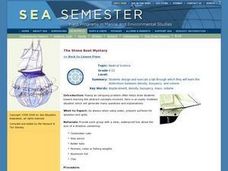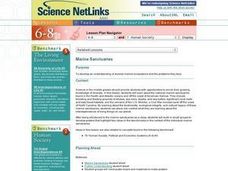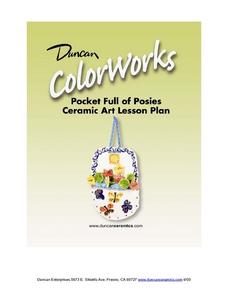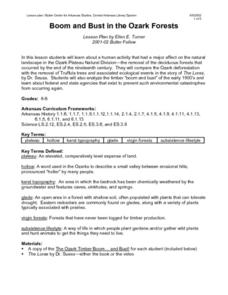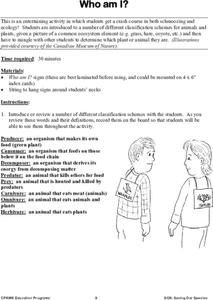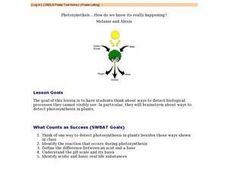EnLiST
Trap Your Own Insects: What’s in Your Backyard?
Young entomologists construct three types of insect traps—pitfall, pollinator, and panel—before setting their traps out and observing what they caught. They then observe what types of insects the different traps attract.
Teach Engineering
Constructing Sonoran Desert Food Chains and Food Webs
Investigate desert biomes by creating food chains and food webs. Groups first research feeding habits of organisms in the Sonoran Desert. This information helps pupils draw food chains and webs to determine relationship between organisms.
Teach Engineering
Live Like an Animal
When your parents say that your room's a pig sty, tell them about biomimicry. The sixth installment of a nine-part Life Science unit has scholars research the shelters used by animals in the natural world, like turtle shells. Using the...
Lee & Low Books
Classroom Guide for Sacred Mountain: Everest
The most famous climbers of Mount Everest could never have made it to the summit without the assistance of the local Sherpa. Christine Taylor-Butler's nonfiction children's book Sacred Mountain: Everest is the focus of an extensive...
Curated OER
The Stone Boat Mystery
Students design and execute a lab through which they study the distinctions between density, buoyancy, and volume.
Curated OER
Microfishing
Students use a simple method to collect living microorganisms from natural and/or artificial environments and develop skills in microscopy, observation, drawing, speculation, hypothesizing, oral presentation, and raising questions.
Curated OER
Acid Rain
Simulated acid rain, a dilute sulfuric acid solution, needs to be prepared for this demonstration. After a condensed lecture on acid rain, you will apply the solution to a sample of granite and a sample of limestone. Your young...
Curated OER
Spaceship Earth
Students develop an understanding of our planet as a system by designing a very-long-duration space mission in which the life-support system is patterned after that of earth.
Curated OER
Marine Sanctuaries
Middle schoolers delve into diverse marine ecosystems and the problems they face. They discover students the national marine sanctuaries found in the Pacific and Atlantic oceans and off the coast of American Samoa.
Curated OER
Timeline for Bird and Plant Research
Learners research and observe birds and plants in selected habitat areas.
Curated OER
Oh Deer!"
Young scholars explore the essential components of a habitat, which is food, water, and shelter. They end the lesson by paying the Oh Deer! game.
Curated OER
Prairie Scavenger Hunt
Middle schoolers take a close look at the prairie environment. They identify common plants and animals of the prairie. In addition, pupils work in teams in order to put together a presentation on a certain aspect of the prairie...
Curated OER
Appearances Are Deceiving
Young scientists study creeks around their area to see how clean the water really is. One way to tell is by the invertebrate populations that are present. This lesson introduces a game which learners simulate a variety of species found...
Curated OER
Spring
Students examine lichens in an outside field trip. Students explore the diversity of this organism and ask questions about them.
Curated OER
Let's go to the Video Tape!
Using actual data from a deep-sea video survey, high school marine biologists consider the biodiversity, compare species richness between two communities, and learn to calculate the diversity index. The lesson plan is all-inclusive,...
Curated OER
Keep Away
Study biological diversity by analyzing given data, and make inferences about the possible effects of oil drilling operations on specific benthic communities. This lesson plan allows learners to use their statistical analysis skills...
Curated OER
Pocket Full of Posies: Ceramics
After studying the plant or flower life cycle, have the class create a basket of flowers out of clay. They hone their ceramics skills while they push, pull, then paint clay to look like flowers they've seen in nature. There are several...
Curated OER
Praire Biome Models
Fifth graders, in groups, list the physical characteristics of a biome and think of ways in which animals might have to adapt to live there and make a biome mobile ball that show the different types of habitats that shape the praire biome.
Curated OER
Boom and Bust in the Ozark Forests
Here is a hard-hitting, cross-curricular lesson on the effects that the deforestation of the Ozark forests in the 19th century had on the people, animals, and ecosystems of the area. The Dr. Seuss book The Lorax is used as a way of...
Curated OER
Solid Waste and Recycling
Young scholars demonstrate effects of waste on environment and ways of reducing it, observe how much packaging goes into bag lunches each day, and survey their families to assess awareness levels and household recycling practices....
Curated OER
Peregrine Falcon
Young environmentalists study the effects that pesticides have on birds, such as the peregrine falcon. They also look at predator/prey interactions. Some wonderful in-class activities accompany an inventive instructional activity. After...
Curated OER
Who Am I?
Students classify organisms into one of five categories: producer, consumer, decomposer, predator, or prey. Students play a "Who Am I" game. Signs are hung on the backs of fellow students They must ask questions to determine what...
Curated OER
Ecosystem Lesson Plan: Food Chain/Food Web
Students discuss ecosystems, eliciting their current knowledge of an ecosystem. Students receive an Ecosystems document and look at the picture. Students brainstorm connection between the cover picture and ecosystems. The indicated...
Curated OER
Photosynethsis....How do we know it's really happening? - Biology Teaching Thesis
Students think of one way to detect photosynthesis in plants besides those ways shown in class. They identify the reaction that occurs during photosynthesis. Students define the difference between an acid and a base. They identify acidic...
Other popular searches
- Population Ecology
- Animal Ecology
- Human Ecology
- Behavioral Ecology
- Ecology Principles
- Community Ecology
- Pond Ecology
- Ecology Organizations
- Global Ecology
- Ecology Ethics
- Ecology Food Webs
- Ecology and Plants






